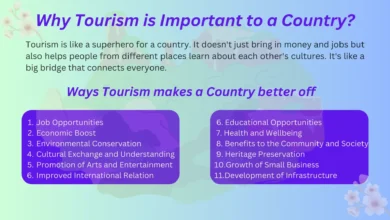
Importance of strategic planning for Tourism
Tourism as a global industry has an ever-increasing significance in the overall economy and cultural life of any country that aspires to achieve sustainable development and long-term prosperity. Tourism, like any other economic activity, cannot be left unregulated it must be properly planned, managed, and promoted if it is to generate benefits and not cause damage to both the local community and the tourist itself. This article discusses some of the significant issues relating to the importance of strategic planning in tourism.
What is Strategic Planning?
The importance of strategic planning lies in the fact that it helps businesses achieve their goals. It involves setting objectives, analyzing the current situation, identifying opportunities and threats, and developing a plan of action. A well-crafted plan can help a business to make better decisions, allocate resources more effectively, and measure progress.
A poorly thought-out plan will result in ineffective actions and wasted time, money, and resources. Strategic planning is not just for large corporations; it applies to all types of organizations including government agencies, schools, NGOs, churches, etc. It should be noted that there are various frameworks that have been created to guide strategic planning processes. One such framework is SWOT analysis (strengths, weaknesses, opportunities, and threats). The primary objective of SWOT analysis is to determine how an organization can use its strengths to gain a competitive advantage over others or turn its weaknesses into opportunities.
The most successful businesses don’t simply focus on short-term gains but instead take a long-term view by investing in future growth and developing strategies for sustainable success. The importance of strategic planning is also evident by looking at successful businesses.
What is the importance of Strategic Planning?
1. Strategic planning is important for any business, but especially for businesses in the tourism industry.
2. A good plan can help you anticipate changes in the market and make necessary adjustments to your business model.
3. Without a plan, it can be difficult to know what your next move should be, or how to best use your resources.
4. A well-thought-out plan can also help you measure your progress and see where you need to make improvements.
5. When developing a plan, it’s important to ask yourself: What are my strengths? What are my weaknesses? Where am I trying to go? What do I want from this business? How will I get there?
6. Lastly, if you’re having trouble coming up with ideas on your own, there are plenty of online tools that can help. There are even some templates available for free! Tools like these can really take some pressure off of figuring out all the specifics of your plans by providing a pre-made template that covers everything you might need.
The result? You’ll have time to work on perfecting one aspect instead of stressing about all aspects at once! The importance of strategic planning for those who run hotels and other tourist attractions cannot be understated.
Staying competitive in the ever-changing world of tourism also adds to the importance of strategic planning in tourism. Planners must keep their eye on the future and prepare accordingly.
How do I start Strategic Planning?
Strategic planning is a process that any business, including a tourism business, can use to think about and plan for its future. The first step is to come up with the company’s mission statement, which will guide all future decision-making. Next, you’ll need to do some market research to understand your customers and what they want.
Once you have that information, you can start setting goals and objectives for your business. These goals should be measurable so you know when you’ve achieved them. If you don’t know where to start, we recommend asking yourself these five questions: What are my values? What are my resources? Who are my stakeholders? Where am I now? And where do I want to go from here? How much time do I have? How much money will it take to get there?
Who needs to be involved?
The first step is to determine who needs to be involved in the process. This includes senior management, marketing, sales, operations, and finance. Once you have assembled your team, you can begin to develop your strategy. A good place to start is by determining your goals for the next five years. What do you want to accomplish? What do you want to remain unchanged? Developing this outline will help keep your team on track when they are developing their specific plans.
For example, if one of your goals is to increase guest satisfaction ratings from 68% to 85%, it’s crucial that all departments understand what this means and how they can contribute. It also helps them know what outcomes are expected from them, so there isn’t any confusion or lack of accountability.
What questions should I ask myself?
1. What are my goals for my business?
2. What can I realistically achieve in the short and long term?
3. What are the unique selling points of my business?
4. Who is my target market?
5. How will I reach them? 6. Where should I be online?
7. How do I want to position myself online?
8. What differentiates me from other companies in my industry?
9. Is this what people would expect from a company like mine?
10. Who else do I know who could benefit from this type of marketing strategy?
11. Will this work with what we already have going on with our company, or will it conflict with it?
12. How much time am I willing to invest in this project (including both time and money)?
13. Am I targeting consumers within my country only, or internationally as well?
14. Are there any limitations to what I want to do in terms of budget?
15. What kind of content do I need to create that will engage potential customers?
16. What are the strengths and weaknesses of my product/service offerings?
17. Do I have an existing customer base that may provide valuable feedback about new products/services that they might enjoy buying or trying out?
The importance of strategic planning in tourism
A mission statement is a brief description of your company’s purpose, goals, and values. It should be clear and concise, and it should explain what makes your business unique. A good mission statement can help you attract customers and employees, and it can guide your decision-making.
What is the importance of strategic planning for the tourism business?
The importance of strategic planning can not be ignored in any industry, but it is especially important for businesses in the tourism industry. Tourism is one of the world’s most popular industries, with approximately 7% of the global GDP generated by the industry. To keep up with this ever-changing market and economy, companies need to have strategies that are robust enough to accommodate any kind of situation that might arise.
Conclusion:
A good strategy is important for the success of any business, but it is especially important in the tourism industry. This is because the industry is so competitive and there are so many variables that can impact a business. A well-thought-out strategy can help a tourism business to survive and even thrive in spite of these challenges. The first step is assessing your strengths and weaknesses relative to your competitors. The importance of strategic planning for the development of tourism can not be undermined.
From this analysis, you will be able to see what areas need improvement or focus in order to increase market share. Another step would be researching the competition and monitoring trends by watching competitors closely through social media, blogs, websites, etc. After understanding what other people in your field are doing you will be able to see how you stack up against them before coming up with a plan of action that will work best for your company’s unique situation.




